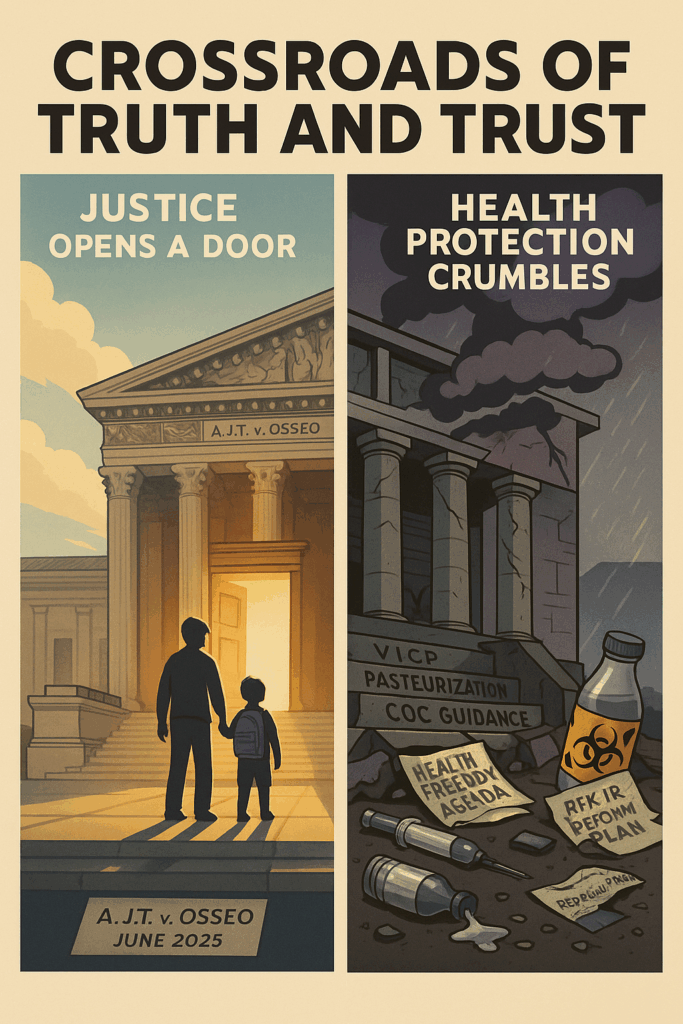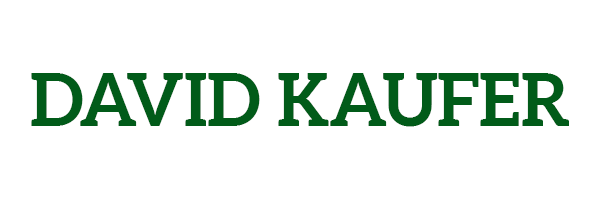The Darker Side of the Spectrum – Volume V
Entry 1: When the Court Opens a Door—and Health Officials Slam One Shut
The win: On June 12, 2025, the U.S. Supreme Court unanimously ruled in A.J.T. v. Osseo Area Schools, lifting a decades-long barrier that made it nearly impossible for families to sue schools for disability discrimination unless they could prove bad faith—a high legal bar rarely met. Chief Justice Roberts, writing for the Court, affirmed that students denied services under the Americans with Disabilities Act (ADA) and Section 504 do not have to exhaust all administrative channels before seeking justice in court.

The case centered around A.J.T., a Minnesota student with multiple disabilities, whose school district reduced his services and failed to communicate with his family. After enduring significant setbacks, his parents tried to hold the district accountable—but were initially blocked by procedural hurdles. The Supreme Court’s decision rebalanced the scales.
For families across the country, this ruling is monumental. It acknowledges that students with disabilities deserve a meaningful path to justice—not just bureaucratic roadblocks. As Roman Martinez, the family’s attorney, noted: “This should lead schools to be more careful.”
But even as the Court opened one door, another was being quietly shut.
The loss: Just weeks later, the Department of Health and Human Services abruptly canceled a scheduled meeting of the U.S. Preventive Services Task Force (USPSTF), an independent panel that has long advised the public on evidence-based preventive care. No reason was given. But the timing is telling. Earlier this year, the Supreme Court ruled that RFK Jr.—now serving as HHS Secretary—has the authority to fire and replace members of the Task Force at will.
This matters. The USPSTF plays a vital role in shaping coverage mandates under the Affordable Care Act, particularly around cancer screenings, immunizations, and maternal care. If that guidance becomes politicized or delayed, access suffers—especially for marginalized and disabled communities who already face structural health inequities.
At the exact moment the judicial branch restored a sliver of justice, the executive branch—under RFK Jr.’s leadership—undermined one of the only mechanisms protecting public trust in science-based health policy.
The contrast could not be more stark.
⸻
Entry 2: Milk, Money, and Misinformation: RFK Jr.’s Dairy Pivot
In a July press conference, RFK Jr. made headlines by calling for an expanded role for dairy in national nutrition guidelines. “I grew up in a world where milk was the healthiest thing you could eat,” he declared, citing cherry-picked studies that suggest higher protein and fat intake may be beneficial—while conveniently ignoring decades of research pointing to dairy intolerance, GI issues, and inflammatory responses in vulnerable populations.
The autism community in particular raised alarm. Casein, the primary protein in cow’s milk, has long been linked to gastrointestinal problems in autistic individuals, especially non-speakers who often struggle to communicate physical pain. Several studies and anecdotal reports have associated dairy-free diets with improvements in behavior, communication, and overall comfort for some autistic children.
To be clear: science around diet and autism is still evolving. But RFK Jr.‘s sweeping endorsement of dairy as the healthiest dietary staple flies in the face of medical consensus—and disregards a vast number of families who have spent years trialing casein-free diets to improve their children’s quality of life.
This is not just a nutritional debate. It’s a warning about what happens when personal nostalgia is elevated above scientific evidence. When HHS becomes a platform for opinion over data, those with the least power—disabled kids, low-income families, and communities of color—bear the consequences.
⸻
Entry 3: Cracks in the Shield: RFK Jr. Targets Vaccine Injury Compensation
In a July 2025 exposé by ProPublica, investigative journalists revealed RFK Jr.’s quiet moves to restructure—or possibly dismantle—the National Vaccine Injury Compensation Program (VICP), which has operated since 1988 as a no-fault system to adjudicate and compensate rare cases of vaccine injury. The program was created as a compromise: shielding manufacturers from liability while still providing a path to justice for families harmed by vaccines.
Critics have long argued that VICP needs an overhaul. The backlog of cases is severe, the cap on damages outdated, and the process too slow for grieving or struggling families. But RFK Jr.’s approach appears less about reform and more about destabilization.
Rather than proposing ways to improve the system, he has aligned with voices pushing to abolish it altogether—without a clear replacement. This leaves families who do experience vaccine-related harm in a dangerous limbo: no path to compensation, no access to justice, and no trust in public health institutions.
It’s worth noting: the U.S. is not alone in having such a system. Countries including Germany, France, Italy, Canada, Japan, and the U.K. all maintain government-funded vaccine injury programs. The solution isn’t to scrap them—it’s to modernize them.
In a world already awash in misinformation, this is not the time to burn down the one structure that acknowledges the risks of vaccines while upholding their critical role in public health. Dismantling VICP is not about safety. It’s about sabotage.
⸻
Final Reflection: A Balancing Act—or a Tipping Point?
Volume V of The Darker Side of the Spectrum reflects a fragile moment in American disability and health policy. On one hand, we celebrate a rare victory at the Supreme Court—a recognition that disabled students deserve justice without unreasonable barriers. On the other, we witness a health department in freefall: science dismissed, programs gutted, protections eroded.
We are not just seeing policy shifts. We are witnessing the reshaping of trust.
Trust in our courts. Trust in public health. Trust that those in power will use their platforms to protect, not endanger, the most vulnerable among us.
For families like mine, and for countless non-speaking autistic individuals whose voices have long been ignored, this isn’t abstract. It’s personal. And it’s why we will keep watching—and keep writing.
References:
1. Supreme Court decision – A.J.T. v. Osseo Area Schools:
https://www.startribune.com/supreme-court…/600383746
2. Preventive Services Task Force cancellation coverage – The Hill:
https://thehill.com/…/4788347-hhs-abruptly-cancels…
3. RFK Jr.’s dairy comments – initial press coverage:
https://www.politico.com/…/rfk-jr-hhs-dairy-guidelines…
4. Autism and dairy sensitivity – Autism Research Institute:
https://www.autism.org/dietary-intervention
5. ProPublica report on RFK Jr. and vaccine injury compensation:
https://www.propublica.org/…/rfk-childhood-vaccines-vicp
6. Comparative global vaccine injury programs – World Health Organization resource overview:
